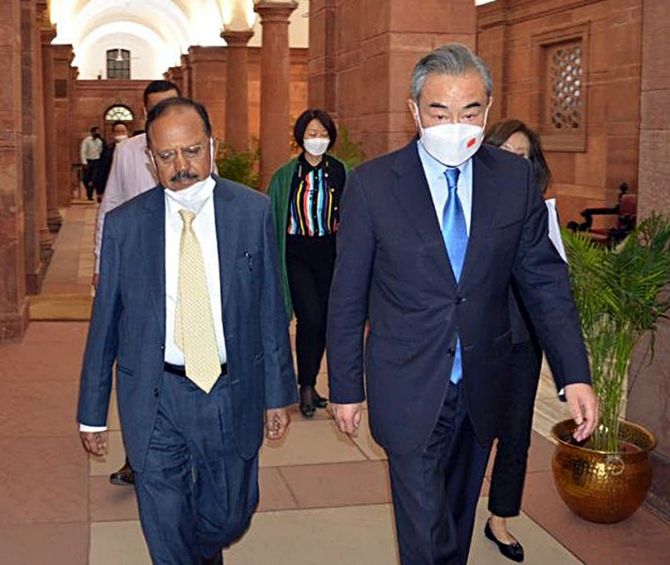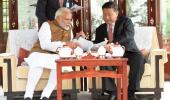What is it that China seeks and why has the Ladakh border become and remained hot for two years and what is going on in Arunachal Pradesh?, asks Aakar Patel.

The strength of democracies is transparency. When the people know of the difficulty a nation faces, they can combat it together.
They become closer, knowing that they face a threat jointly.
This spirit, though possible, is not easy to achieve in nations that do not have democracy because authoritarian leadership is secretive.
An example of what is meant is visible today in the war being fought in Europe.
Ukraine has come together and the world sees its spirit in the face of adversity.
There is, of course, a dispute over the manner in which Ukraine arrived at its present democracy and that is part of the reason Russia has invaded it.
But there is no dispute about how the two nations today differ in terms of transparency.
Ukrainians know what they face and have come together to face it.
This month Russia blocked access to Facebook for its citizens because Vladimir Putin doesn't want the people to know what is going on. He has also introduced a law that punishing media outlets with 15 years in jail for reporting on the military.
This will produce anxiety and alarm in many Russians and will be damaging in the long term for the nation.
Sunlight is the best disinfectant is a saying and it alludes to transparency in organisations and in government.
On March 25, the foreign minister of China came to India. The government said it was an 'unannounced' visit though the media was aware Wang Yi was coming.
He met with our foreign minister and also met the national security advisor so the subject of his visit was not a secret: It is the situation in Ladakh.
Wang asked to meet the prime minister, but this was not allowed, with the excuse that Modi was away in Uttar Pradesh for Adityanath's swearing-in.
This is the second clue we have and it indicates to us that India is displeased with the situation. What is the situation?
This is the problem. Indians have been told by the prime minister himself that there is no problem and that nobody is on our territory.
The defence minister has said that nobody is stopping India's soldiers from patrolling in the spaces that they have been historically patrolling.
If this is the case, then what is there to discuss with the Chinese? This the government is not telling us.
What is called the godi media reported that it was the Chinese side that wanted disengagement and this was because 'the present situation was not in mutual interest'.
Disengagement from what? If they are on their side, then there is no real problem.
On March 11, generals from the Indian Army and Chinese army met for the 15th round of talks since the clash of 2020.
What do they talk about if there is no intrusion? Our government has not said.
The Indian Express reported the following day that 'both sides have a platoon-sized strength of soldiers in Hot Springs, but the Chinese troops are on the Indian side of the Line of Actual Control'.
The government did not deny this report and did not comment on it.
Most experts, including retired generals who write, are of the opinion that Indian land has been intruded on and China is refusing to vacate and that is the problem.
Some have written that this may escalate and it will be the Chinese who will escalate it.
There has also been news of their encroachment into fresh areas in Arunachal Pradesh (which the Chinese claim because the sixth Dalai Lama of Tibet was born in Tawang in 1643).
China is a dictatorship like Russia and doesn't like transparency.
India is a democracy, but we have chosen to not be transparent on this issue (among others), for whatever reason.
I don't want to speculate about why though it is quite clear to me what the reason is.
We should consider that India is not a dictatorship and should be using her natural strength as a democracy.
For some reason we are not, and in fact we appear to be misleading ourselves.
And we are giving space to China.
The foreign policy experts in Beijing will have noticed the confusion that has been produced by the Indian government.
It is unlikely that they will not have assessed how it can be used to their advantage.
What is it that China seeks and why has the Ladakh border become and remained hot for two years and what is going on in Arunachal Pradesh?
What does this all have to do with the road that China has built in Pakistan occupied Kashmir, which connects western China to Balochistan?
China controls a port in Sri Lanka and Bangladesh newspapers are full of positive reports about joining China's Belt and Road plan.
Nepal is also a part of this plan.
In South Asia, India and Bhutan alone have refused to join.
What does this mean for the long term future of India and what are the threats and challenges we may face in the future?
Democracies can negotiate their ways through difficult problems because they have transparency and the strength of the entire polity, the people and the opposition and civil society can come behind the government.
For this to happen however, there must be honesty and transparency.
It is clear that here, on this issue with China which continues, unfortunately that has not been the case.
Aakar Patel is a columnist and writer and you can read Aakar's earlier columns here.
Feature Presentation: Aslam Hunani/Rediff.com










